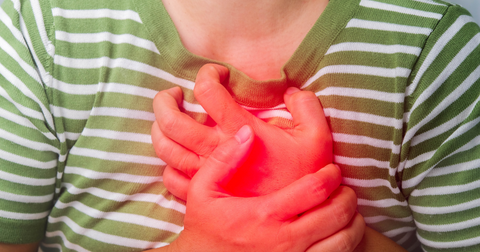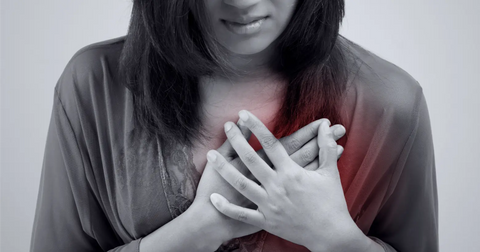Your Cart is Empty
Methods may include stress coping strategies, talking with a mental health professional, and, if recommended, prescribed options to address anxiety.

The relationship between our emotional well-being and physical health is complex, with the heart often at the center of this connection. Many experience a tight, constricting sensation in their chest during periods of stress or emotional difficulty. This leads to an important question: Can stress manifest as physical chest pain? Moreover, how does this compare with conditions like Broken-Heart Syndrome?
This article aims to shed light on stress-induced chest pain, exploring its causes, symptoms, and how it differs from Broken-Heart Syndrome and heart attacks. We will also offer guidance on managing anxiety-related chest pain and understanding when it's crucial to seek medical help.

Stress chest pain, often referred to as anxiety chest pain or anxiety-induced chest pain, is a physical manifestation of stress.1 When the body releases stress hormones during anxious moments or panic episodes linked to the fight-or-flight response, heart rate and blood pressure can rise. This reaction may bring on a sharp or dull chest sensation, which some might confuse with discomfort related to heart issues.
Such changes can manifest as chest pain or discomfort, which varies from sharp or stabbing sensations to a dull ache or tightness.
Unlike cardiac conditions, this type of chest pain is driven by stress rather than heart damage, rooted in the body's physiological rather than structural issues.
Stress chest pain typically starts during or shortly after acute episodes of stress, anxiety, or panic attacks. These episodes can be triggered by a wide range of stressors, from personal and work-related issues to sudden, unexpected events such as the loss of a loved one or a significant life change.1
The onset of chest pain can be sudden, catching individuals off guard, which can further exacerbate their feelings of stress or anxiety, creating a feedback loop that intensifies the symptoms.
The duration and intensity of stress chest pain can vary based on the individual's stress level, overall health, and coping mechanisms. Some may experience brief moments of discomfort, while others might endure longer periods of pain.

Recognizing the triggers and understanding the conditions under which the pain starts are crucial steps in managing and eventually reducing the occurrence of stress-induced chest discomfort.
Common triggers can include ongoing anxious feelings, sudden panic episodes, or other anxiety-related experiences, where the feelings themselves may lead to chest discomfort or a heightened anxious response.
Anxiety-induced chest pain is distinct from Broken-Heart Syndrome, a temporary condition often triggered by extreme stress or loss, leading to heart attack symptoms like chest pain and shortness of breath.
Broken-Heart Syndrome, medically known as Takotsubo cardiomyopathy, mimics the symptoms of a heart attack, including chest pain and shortness of breath, but with no blockage in the coronary arteries.2
Unlike anxiety chest pain, which is tied to the fight or flight mechanism without causing damage to the heart, Broken-Heart Syndrome can mimic heart attacks or coronary artery disease in symptoms but is characterized by normal angiography results, with the heart's structure remaining unaffected.2
Recovery from Broken-Heart Syndrome can be quick, often within days or weeks, and most people don't suffer long-term damage to their heart health. However, the syndrome can lead to complications in rare cases, emphasizing the need for medical evaluation and management.

Both stress chest pain and Broken-Heart Syndrome highlight the significant impact stress can have on our physical health, underscoring the importance of stress management and emotional well-being in maintaining heart health. Understanding the differences between these conditions is key to recognizing when to seek medical advice and how to approach treatment and management.
Distinguishing between stress chest pain and heart attack symptoms is crucial. Heart attacks are caused by coronary artery disease and demand immediate medical attention. In contrast, anxiety-induced chest pain, while distressing, is part of the body's response to stress and does not signify underlying heart disease.1 However, any new or severe chest pain warrants a visit to the emergency department to rule out cardiac causes.3
| Heart Attack | Anxiety Chest Pain | |
|---|---|---|
| Cause | Reduced blood flow to the heart due to artery blockage. |
Physical sensations that can occur during stress, anxious moments, or panic, even when the heart itself is unharmed. |
| Symptoms | Persistent chest pain or discomfort, along with nausea, and discomfort in other body parts. | Sharp, tight chest pain, rapid heartbeat, shortness of breath, usually without nausea. |
| Onset | Can happen anytime, often related to physical exertion. |
During stressful situations or following anxious experiences. |
| Duration | Lasts several minutes or more, not improving with rest. | Typically brief, subsiding with relaxation. |
| Risk Factors | Lifestyle and health conditions like smoking and high blood pressure. | Sustained stress and frequent experiences of anxiety. |
| Treatment | Emergency intervention, medication, lifestyle changes. |
|
Effectively navigating anxiety-related chest discomfort calls for a well-rounded approach, addressing both quick ways to ease the moment and longer-term habits that can help lessen stress and worry over time.
When experiencing feelings of anxiety chest pain, techniques such as deep breaths, mindfulness exercises, and grounding can offer quick relief. Deep breathing can help slow down the heart rate and reduce the intensity of chest pain. Grounding techniques, such as naming objects around you or engaging the senses, can divert the mind from panic and foster a sense of calm.4
For lasting improvement, it helps to explore and address the underlying factors contributing to anxious feelings. Cognitive-behavioral therapy (CBT) has been shown to be particularly effective for feelings of anxiety, helping individuals identify and change thought patterns that contribute to anxiety symptoms. Regular physical activity is also recommended, as it can reduce feelings of stress and improve mood.1

Another critical component is making lifestyle changes. These include ensuring enough sleep, adopting a healthy diet, reducing caffeine and alcohol intake, and setting aside time for relaxation and hobbies. These adjustments can help lower baseline stress levels, making stressful situations more manageable.
In some cases, medication may be prescribed by a healthcare provider. Selective serotonin reuptake inhibitors (SSRIs) and other anti-anxiety medications can help manage symptoms feelings of anxiety and panic, reducing the frequency and severity of chest pain.1
Seek emergency medical care if you're experiencing chest pain that's new, severe, or accompanied by other symptoms like shortness of breath, abnormal heart rhythms, or gastrointestinal symptoms.
It's better to err on the side of caution and get assessed by a healthcare provider than to self-diagnose, especially when heart attack symptoms could be a possibility.
Understanding and navigating anxiety-related chest discomfort involves becoming aware of how your body responds to stress, trying out helpful coping approaches, and recognizing when it may be wise to seek professional guidance.
By learning to recognize signs that may indicate anxiety-related chest discomfort and how they differ from heart attack symptoms, individuals can respond in ways that help them feel more at ease and support their overall well-being.
Keep in mind that feelings of anxiety can sometimes show up physically, including as chest sensations, but there are ways to address them with supportive habits and guidance. Proactively working to manage stress and anxious thoughts can help foster a healthier sense of balance.
Don't let stress affect your physical health. Seredyn Complete Calm helps reduce the physiological impacts of stress with natural ingredients that support your brain's calming mechanisms.
Take control of your stress response with Seredyn.
Can stress chest pain cause permanent damage?
No, it doesn't cause permanent heart damage but managing feelings of stress is important for overall health.
How long does stress chest pain last?
Duration varies, typically lasting a few minutes to hours. Persistent symptoms warrant medical evaluation.
Are there specific triggers for stress chest pain?
Yes, emotional stress, anxiety, panic attacks, and physical stressors can trigger chest pain.
Can Broken-Heart Syndrome be fatal?
It can lead to severe complications but is generally treatable, with most recovering fully.
Huffman, J. C., Pollack, M. H., & Stern, T. A. (2002). Panic Disorder and Chest Pain: Mechanisms, Morbidity, and Management. Primary care companion to the Journal of clinical psychiatry, 4(2), 54–62. https://doi.org/10.4088/pcc.v04n0203
Mahajani, V., & Suratkal, V. (2016). Broken Heart Syndrome. The Journal of the Association of Physicians of India, 64(6), 60–63.
Johnson K, Ghassemzadeh S. Chest Pain. [Updated 2022 Dec 14]. In: StatPearls [Internet]. Treasure Island (FL): StatPearls Publishing; 2024 Jan-. Available from: https://www.ncbi.nlm.nih.gov/books/NBK470557/
Migliaccio, G. M., Russo, L., Maric, M., & Padulo, J. (2023). Sports Performance and Breathing Rate: What Is the Connection? A Narrative Review on Breathing Strategies. Sports (Basel, Switzerland), 11(5), 103. https://doi.org/10.3390/sports11050103